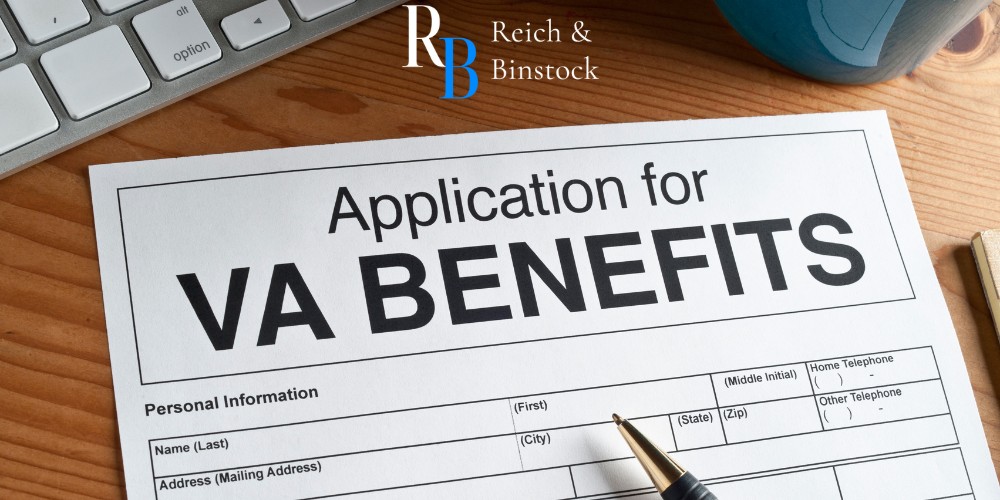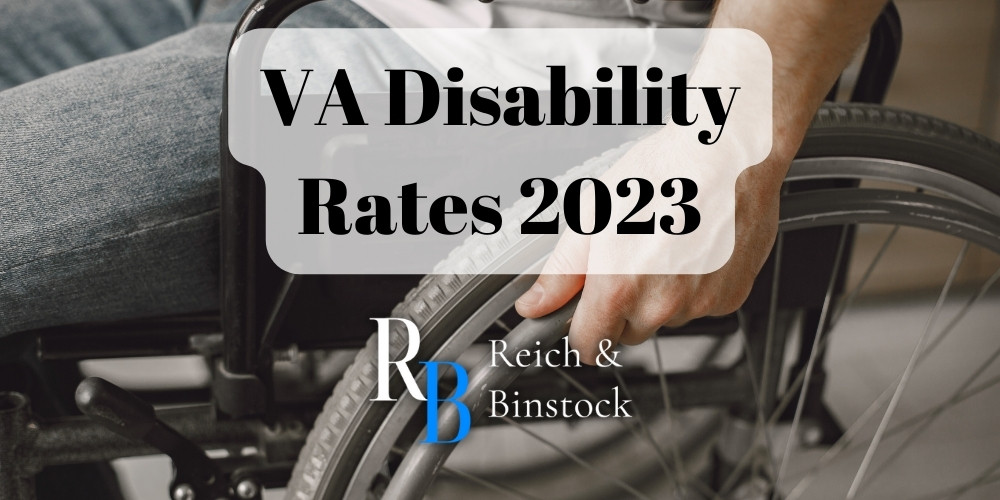2023 VA Disability Pay Rates and Cost of Living Adjustments
According to the Social Security Administration, the 2023 cost-of-living adjustment is 8.7%. Because of this significant increase, we are also seeing a notable increase in the VA disability rates (2023). If you are a veteran who receives VA disability benefits, or if you are a dependent, it is crucial to understand how your VA disability payments may change. This blog aims to outline the different VA disability pay rates for 2023.
At Reich & Binstock, we understand how frustrating it can feel when the VA disability compensation that you earned during your service is not paid out properly. Unfortunately, even the Department of Veterans Affairs is not immune to wrongfully denying VA disability claims. If your VA disability payment was denied, contact a VA claims lawyer as soon as possible. To schedule your free, no-obligation consultation with us, please call our office at 713-622-7271 today.
Types of VA Disability Claims

There are several types of disability compensation claims that veterans can file with the VA. Below, we outline some of the most common types of VA disability claims that veterans file.
Original Claims
This is the first claim that you would ever file for disability benefits. You can first file this claim up to 180 days before you are discharged from active duty. If you have anywhere from 180 to 90 days left before you leave active duty, you can take advantage of the Benefits Delivery at Discharge (BDD) Program. This program allows you to begin receiving benefits when you are discharged from the military.
If you have fewer than 90 days of active duty left, you cannot use the BDD program. However, you can still submit your claim and receive disability compensation once your claim is processed. You can also wait to submit your claim after you have already been discharged.
Claims that are submitted after you have left active duty are called postservice claims. Although there are no time limits on these claims, the process will grow more complicated the longer you wait.
Increased Claims
You can also file an increased claim, which means that your service-connected disability has worsened since you filed your original claim. The claim will aim to increase your disability rating, increase your financial support, or both. In order to succeed with an increased claim, you will need to submit current medical evidence that shows how your disability has worsened.
New Claims
If you have an existing service-connected disability, you can submit a new claim to request certain special monthly payments, increased financial support, or a change in your status to Individual Unemployability. This status is reserved for veterans who cannot work due to their disability.
In order to succeed with one of these claims, you will need to submit new evidence to support them. Any evidence that you have already given the VA will not be considered in a new claim. Examples of new evidence you can submit for your claim include medical reports from a doctor, as well as medical records and test results.
Secondary Service-Connected Claims
If you already have a service-connected disability, and it leads to the development of another disability, you can file a secondary service-connected claim. These claims arise when one’s existing disability causes another disability. For example, if you injured one of your joints while on active duty, this is your original service-connected disability. However, over time, that same joint could develop severe arthritis because of that injury. This is a valid basis for a secondary service-connected claim.
What Is a Service-Connected Disability?
According to the Department of Veterans Affairs, service-connected disabilities are those which were “incurred or aggravated during active military service.” In other words, you can only receive VA disability compensation if your disability happened or was worsened during your period of active military service. Disabled veterans who became disabled after their active duty period will not receive VA disability benefits for their disability.
Special Claims
Special claims allow disabled veterans to request other forms of disability compensation, particularly if their disability causes them to have special needs. Some examples include compensation for special vehicles if the disabled veteran cannot drive, increased disability compensation if the veteran can no longer work, or other temporary payments.
Supplemental Claims
In order to file a supplemental claim, you must meet the following requirements.
- You submitted a VA disability claim once before, and it was denied.
- You did not file an appeal after the denial.
- Your new claim includes new evidence that you have not previously submitted to the VA. This evidence must be directly related to your disability claim.
Types of VA Disability Compensation Benefits

VA disability compensation includes more than just monetary benefits. In general, this compensation exists in order to recognize the effect that active military service has on veterans. The benefits that one receives through the VA are paid out monthly, and they vary depending on whether the veteran has dependent children, a dependent spouse, or even dependent parents.
Other types of additional compensation include the following.
- Tax-free monetary assistance based on the veteran’s VA disability rating
- Dependency and Indemnity Compensation (DIC), which pays tax-free monetary benefits to a surviving spouse, child, or parent of a veteran who died in one of the following ways.
- While on active duty
- Inactive duty training
- Active duty training
- Due to their service-connected disabilities
- Special Monthly Compensation (SMC), which pays out additional tax-free benefits to veterans, their spouses, or surviving spouses or parents. This compensation is paid at a higher monthly rate due to the special needs required by the disability. Examples include needing aid from another person or losing the ability to use a limb.
- Special claims also allow for other types of compensation, such as the following.
- Individual unemployability
- Hospitalization
- Dental benefits
- Birth defects
- Convalescence (recovery from illness or injury)
- An automobile allowance
- Prestabilization (temporary disability compensation)
- Clothing allowance
How Is VA Disability Compensation Determined?
Disability compensation from the VA is determined based on a number of different factors, and it can be difficult to understand what goes into determining a veteran’s disability rating. The VA disability lawyers at Reich & Binstock have extensive experience helping dependents, veterans, spouses, and parents get the compensation they deserve.
In order to determine one’s level of compensation, the VA will begin by using the evidence you submit to determine the severity of your medical issues. They break down all the disabilities that they compensate into categories based on the body part affected. Each diagnosis within a certain category has a code that correlates with the severity of the diagnosis. Generally, the more serious the condition, the higher the disability rating will be.
The VA will handle this part of the process, meaning they will use your medical evidence to identify the body part affected, find your diagnosis, then determine the diagnostic code that corresponds most closely with your symptoms. This code determines your VA disability rating.
Those with more than one disability or rating will have a combined disability rating. In order to obtain this combined rating, the VA will take all of your disability ratings and combine them according to a certain formula.
Will Disabled Veterans Get a VA Disability Increase in 2023?

Yes. Effective December 1, 2022, the 2023 VA disability pay rates will see a year-over-year increase of 8.7% according to the latest cost-of-living adjustment (COLA). This increase was confirmed on October 13, 2022, and is the highest rate increase that the VA has seen in about four decades.
VA Disability Ratings
As we mentioned previously, VA disability rates are determined and assigned based on how serious your service-connected disability is. The VA benefits that you receive on a monthly basis heavily depend on this rating. Along with those monthly monetary benefits, your disability rating will also determine whether you qualify for other types of benefits, such as VA health care.
In order to qualify for VA disability or other additional compensation, you will need to submit evidence of your disability. Some examples of valid evidence include the following.
- VA medical records
- Service treatment records
- Private medical records
- Proof of service connection
In the following sections, we outline the 2023 VA disability pay rates according to the most recent changes.
10% to 20% without Dependents
| Percentage of Disability | Monthly Rate |
| 10% | $165.92 |
| 20% | $327.99 |
30% to 60% with Children
| Status of Dependent | 30% | 40% | 50% | 60% |
| Veteran with Child | $548.05 | $785.86 | $1,108.82 | $1,400.65 |
| Veteran with Spouse and Child | $612.05 | $870.86 | $1,215.82 | $1,528.65 |
| Veteran with Spouse, Child, and One Parent | $660.05 | $934.86 | $1,296.82 | $1,625.65 |
| Veteran with Spouse, Child, and Two Parents | $708.05 | $998.86 | $1,377.82 | $1,722.65 |
| Veteran with Child and One Parent | $596.05 | $849.86 | $1,189.82 | $1,497.65 |
| Veteran with Child and Two Parents | $644.05 | $913.86 | $1,270.82 | $1,594.65 |
| Additional Pay for Each Additional Child Under 18 | $30.00 | $40.00 | $50.00 | $60.00 |
| Additional Pay for Each Additional Child in School Over 18 | $97.00 | $129.00 | $162.00 | $194.00 |
| Additional Pay for an A/A Spouse | $56.00 | $74.00 | $93.00 | $111.00 |
30% to 60% without Children
| Status of Dependent | 30% | 40% | 50% | 60% |
| Veteran Only | $508.05 | $731.86 | $1,041.82 | $1,319.65 |
| Veteran with Spouse | $568.05 | $811.86 | $1,141.83 | $1,440.65 |
| Veteran with Spouse and One Parent | $616.05 | $875.86 | $1,222.82 | $1,537.65 |
| Veteran with Spouse and Two Parents | $664.05 | $939.86 | $1,303.82 | $1,634.65 |
| Veteran with Parent | $556.05 | $795.86 | $1,122.82 | $1,416.65 |
| Veteran with Two Parents | $604.05 | $859.86 | $1,203.82 | $1,513.65 |
| Additional Pay for A/A Spouse | $56.00 | $74.00 | $93.00 | $111.00 |
70% to 100% with Children
| Status of Dependent | 70% | 80% | 90% | 100% |
| Veteran with One Child Only | $1,757.06 | $2,041.15 | $2,293.39 | $3,757.00 |
| Veteran with Spouse and Child | $1,907.06 | $2,212.15 | $2,486.39 | $3,971.78 |
| Veteran with Spouse, Child, and Parent | $2,020.06 | $2,341.15 | $2,631.39 | $4,133.85 |
| Veteran with Spouse, Child, and Two Parents | $2,133.06 | $2,470.15 | $2,776.39 | $4,295.92 |
| Veteran with Parent and Child | $1,870.06 | $2,170.15 | $2,438.39 | $3,919.07 |
| Veteran with Child and Two Parents | $1,983.06 | $2,299.15 | $2,583.39 | $4,081.14 |
| Additional Pay for Each Additional Child Under 18 | $70.00 | $80.00 | $90.00 | $100.34 |
| Additional Pay for Each Additional Child in School Over 18 | $226.00 | $259.00 | $291.00 | $324.12 |
| Additional Pay for A/A Spouse | $130.00 | $148.00 | $167.00 | $185.21 |
70% to 100% without Children
| Status of Dependent | 70% | 80% | 90% | 100% |
| Veteran Only | $1,663.06 | $1,933.15 | $2,172.39 | $3,621.95 |
| Veteran with Spouse | $1,804.06 | $2,094.15 | $2,353.39 | $3,823.89 |
| Veteran with Spouse and Parent | $1,917.06 | $2,223.15 | $2,498.39 | $3,985.96 |
| Veteran with Spouse and Two Parents | $2,030.06 | $2,353.15 | $2,643.39 | $4,148.03 |
| Veteran with Parent | $1,776.06 | $2,062.15 | $2,317.39 | $3,784.02 |
| Veteran with Two Parents | $1,889.06 | $2,191.15 | $2,462.39 | $3,946.09 |
| Additional Pay for A/A Spouse | $130.00 | $148.00 | $167.00 | $185.21 |
What Is a Cost-of-Living Adjustment?

A cost-of-living adjustment (COLA) is an increase to one’s benefits or pay based on the increasing cost of living in terms of goods and services. The increasing cost of living is also known as inflation. COLAs aim to counteract inflation, at least in part. Although not every form of monthly compensation will include a COLA, VA disability benefits do. In fact, the 2023 VA disability rates have noticeably increased due to the cost-of-living adjustment.
File a VA Disability Claim Today
Your 2023 VA disability rates depend on a number of factors, including your dependent status (if applicable), the severity of your disability, and whether or not you have special needs. Regardless, if the VA denied your claim that was perfectly valid, we strongly recommend working with a VA disability lawyer. Our attorneys can either help you submit your initial VA disability claim, or we can provide legal counsel when you submit an appeal.
Do You Need a VA Disability Lawyer?
If you are a veteran with a service-connected disability, you deserve compensation for the time you spent fighting for the rights and freedoms of others. Regardless of your level of disability, you have the right to receive monthly compensation for the physical or mental effects you suffered from your years of service.
If you’re looking to submit a claim or an appeal for VA disability benefits, speak with the insurance claim lawyers at Reich & Binstock. Our attorneys have extensive experience representing veterans and their family members with their disability claims. Whether you’re filing an appeal, an original claim, or a special claim, our legal team is here for you. To schedule your free, no-obligation consultation with us, please call our office at 713-622-7271 today.














